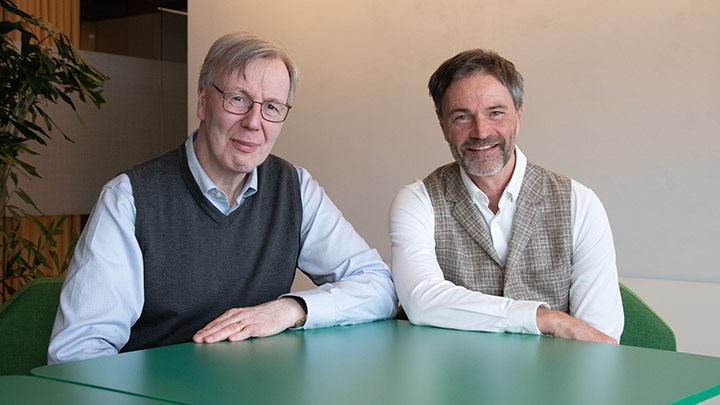Örebro researchers using math to analyse sports – balancing risks against potential gains

Anders Lunander and Niklas Karlsson.
We must often weigh the risks against what we stand to win. Örebro researchers Anders Lunander and Niklas Karlsson have analysed risk-taking and decision-making in sports – with examples from track and field’s long jumping and relay races and sprint cross-country skiing.
“Using mathematics helps us reveal patterns and connections we wouldn’t see otherwise,” says Anders Lunander, a researcher in economics at Örebro University.
Read more about the three studies:
“Choosing opponents in skiing sprint elimination tournaments” published in the Journal of Quantitative Analysis in Sports.
“A stochastic analysis of the 4 × 100 m relay” published in the International Journal of Sports Science & Coaching.
“The Strategic Jump – The Order Effect on Winning ‘The Final Three’ in Long Jump Competitions” published in the Journal of Quantitative Analysis in Sports.
The researchers’ approach to refining problems can be used in various contexts, but they chose to start with sports because the goal of sports is clear: the team or individual competes to win based on a defined set of rules.
“When it comes to households or companies, their actions can be more difficult to grasp in mathematical models because the goal is not necessarily always to maximise expected utility or profit,” says Niklas Karlsson, a researcher in statistics at Örebro University.
Return versus risk
Their model shows how a relay team in track and field can achieve as fast a running time as possible without a failed baton exchange. This can be compared to the relationship applying to financial investments – where the expected return on investment must be weighed against the risk of losing a share of the investment.
Researchers express problems as a formula and solve them using mathematics and game theory.
“Many sports can be described and analysed using game theory or interdependent behaviour. An athlete’s actions in a given situation depend on their opponent’s actions or what the athlete thinks the opponent will do once the opponent has seen how the athlete has acted,” says Anders Lunander.
Sprint cross-country skiing is a case in point. Researchers examined skiers' choices in the quarter-finals and compared them with which choice of quarter-final would maximise a skier’s probability of winning the competition.
A strategic choice – making competition more exciting
Their model describes the skier’s trade-off between an increased probability of being eliminated in the quarter-finals due to expected tougher competition versus an increased probability of winning a potential final, thanks to a longer rest period before the final. Skiers qualifying from the quarter-finals with expected lower competition get a shorter rest period.
“A common argument for changing rules within a sport is that the change will make the sporting event more exciting or increase fairness. However, a risk with popularising rule changes might be that some consequences may be overlooked,” says Anders Lunander.
For example, in track and field’s long jump, rules were changed to keep the competition exciting until the last round and the final jump. However, after the new The Final Three format met with criticism, it was changed. Now, the results from all rounds are included.
Raging competitors – against the system
“The competitors raged against the system because the competitor who was leading after all completed rounds was forced to jump last in the final round. Given the jumps of the two previous jumpers were successful, the leader then ran the risk of ending up in third place on their last jump they had a foul jump,” says Niklas Karlsson.
“We wanted to determine if there is any advantage for the leader jumping last of the three finalists in the final. If that is the case, analyse how great this advantage is. The advantage turned out to be smaller than we expected, but it still increases the chance of winning the final,” says Niklas Karlsson.
Text: Linda Harradine
Photo: Linda Harradine
Translation: Jerry Gray
